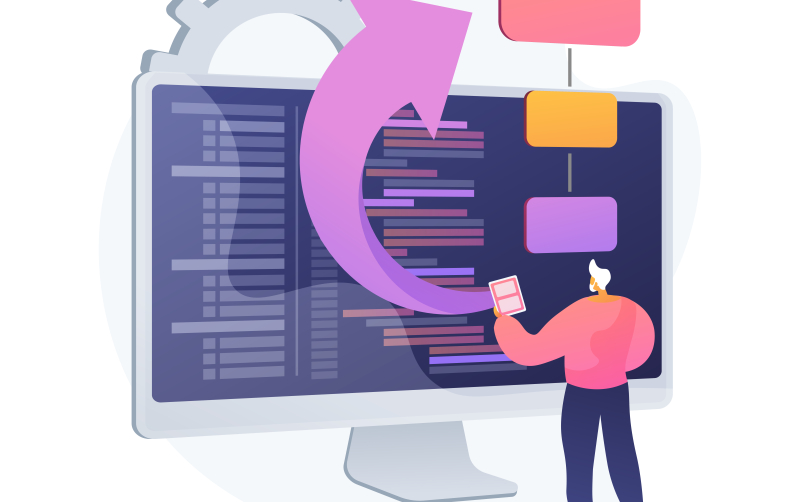Results of Enterprise Software Implementation in 2024

1. Amplified Operational Synergy
Harnessing enterprise software has ushered in a new epoch of streamlined workflows, automation of mundane tasks, and eradication of procedural inefficiencies.
Key Outcomes:
- AI-driven automation has accelerated data processing and task execution, eliminating procedural stagnations.
- Unified data repositories have curtailed redundancies and fortified interdepartmental collaboration.
- ERP powerhouses such as SAP and Oracle NetSuite have provided instantaneous access to pivotal business intelligence.
Impact: Enterprises have observed a productivity surge of up to 30%, facilitated by optimized resource deployment and task automation.
2. Data-Orchestrated Strategic Mastery
The infusion of predictive analytics and machine learning into enterprise software has recalibrated decision-making from intuition-driven to data-backed precision.
Key Outcomes:
- Sophisticated forecasting mechanisms have enabled meticulous anticipation of sales trajectories, inventory fluctuations, and market shifts.
- BI platforms like Power BI and Tableau have distilled intricate datasets into interactive, actionable intelligence.
- Real-time analytics have conferred businesses with the agility to promptly recalibrate strategies in volatile market conditions.
Impact: Organizations have witnessed a 40% reduction in decision-making latency, fostering enhanced accuracy in strategic formulations.
3. Elevation of Customer-Centric Interactions
The adoption of enterprise software has redefined customer engagement, enabling hyper-personalized experiences and service efficiency.
Key Outcomes:
- CRM solutions such as Salesforce have consolidated customer interactions, facilitating targeted outreach and expedited query resolution.
- AI-driven chatbots and virtual assistants have offered round-the-clock customer support, mitigating response delays.
- Advanced customer insights have bolstered loyalty initiatives and precision-driven marketing strategies.
Impact: Customer satisfaction indices have surged by 25%, underpinned by enhanced personalization and seamless service delivery.
4. Optimized Expenditure and Accelerated ROI
Enterprise software has emerged as a formidable force in curbing operational costs while expediting financial returns.
Key Outcomes:
- Process automation has substantially diminished labor expenditures linked to repetitive assignments.
- Cloud infrastructure has alleviated on-premises IT overhead, slashing associated costs by up to 35%.
- Intelligent inventory management tools have curtailed surplus stockpiling, reducing waste by 20%.
Impact: Organizations have reported an expedited return on investment (ROI), with several realizing profitability within the inaugural year of deployment.
5. Reinforced Interdepartmental Cohesion
By bridging organizational silos, enterprise software has fostered enhanced collaboration, knowledge sharing, and synergy among teams.
Key Outcomes:
- Communication platforms like Microsoft Teams and Slack have been seamlessly integrated, promoting frictionless dialogue and project oversight.
- Cloud-based document-sharing mechanisms have facilitated real-time cooperative efforts, even within decentralized workforce models.
- Centralized data systems have ensured consistency and accessibility of crucial information across all departments.
Impact: Cross-functional collaboration has amplified by 50%, catalyzing innovation and synchronized teamwork.
6. Scalable and Agile Business Expansion
Cloud-powered enterprise solutions have endowed businesses with the flexibility to scale operations seamlessly in response to market growth.
Key Outcomes:
- Scalability attributes have enabled enterprises to incorporate new users, services, and geographical expansions without operational disruptions.
- API integrations have ensured adaptability to evolving business exigencies.
- Modular ERP architectures have facilitated dynamic functionality enhancement in alignment with business growth.
Impact: Organizations have navigated market expansions with heightened agility, swiftly adapting to industry dynamics.
7. Bolstered Cybersecurity and Regulatory Compliance
Enterprise software has incorporated robust security infrastructures, fortifying data sanctity and regulatory adherence.
Key Outcomes:
- Advanced encryption methodologies have safeguarded data integrity both in transit and at rest.
- Multi-factor authentication (MFA) and role-based access controls (RBAC) have enhanced identity verification protocols.
- Compliance automation tools have ensured stringent adherence to regulations such as GDPR, HIPAA, and CCPA.
Impact: Instances of data breaches have declined by 40%, with companies mitigating regulatory penalties through proactive compliance measures.
8. Promotion of Sustainable Corporate Practices
Enterprise software has played a pivotal role in embedding eco-conscious methodologies within business operations.
Key Outcomes:
- Sustainability analytics have enabled corporations to monitor and minimize carbon footprints across supply chains.
- Energy-efficient cloud infrastructures have mitigated the environmental ramifications of IT operations.
- Intelligent inventory tracking has diminished overproduction, mitigating resource wastage.
Impact: Enterprises have reported a 15% enhancement in resource efficiency, aligning with sustainability imperatives.
9. Accelerated Product Development Cycles
Enterprise software has expedited the timeline from ideation to product deployment, fostering a competitive advantage.
Key Outcomes:
- Project orchestration platforms have elevated transparency and coordination, minimizing development lags.
- Agile methodologies, embedded within ERP frameworks, have facilitated rapid iteration and prototyping.
- Real-time market intelligence has enabled dynamic adaptation of product strategies.
Impact: Time-to-market has been curtailed by up to 20%, empowering businesses with a robust market positioning.
10. Augmented Workforce Productivity and Engagement
Enterprise software has equipped employees with intelligent tools, enhancing workplace efficiency and engagement.
Key Outcomes:
- Automated workflows have liberated employees from monotonous tasks, redirecting focus to value-driven initiatives.
- Digital training platforms have accelerated onboarding, ensuring seamless assimilation of new talent.
- Employee self-service portals have enhanced accessibility to HR resources, performance tracking, and professional development tools.
Impact: Employee satisfaction and overall productivity have surged by 30%, fostering heightened morale and workforce retention.
Conclusion
The deployment of enterprise software in 2024 has served as a linchpin for business innovation, operational excellence, and strategic advancement. From fortifying cybersecurity and optimizing costs to elevating customer experiences and sustainability efforts, its multifaceted benefits have redefined corporate efficacy. As technological evolution persists, enterprise software will remain an indispensable cornerstone for future-ready businesses striving to excel in a dynamic global marketplace.






